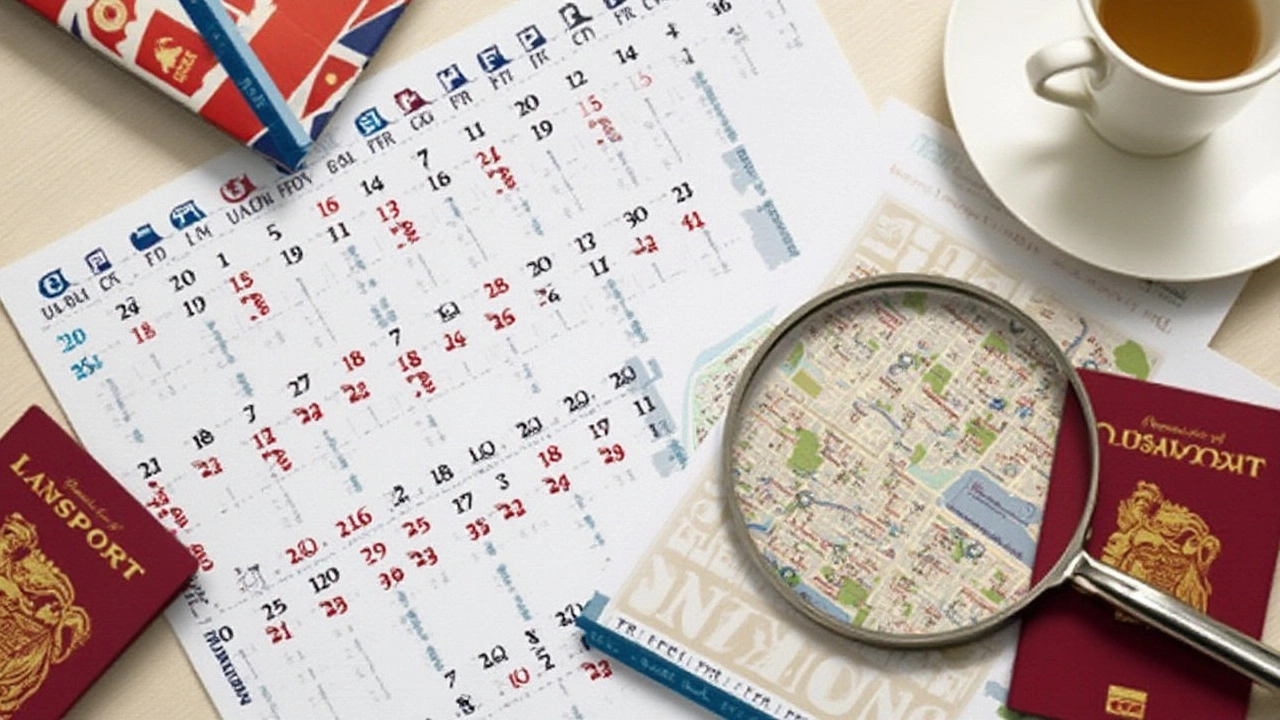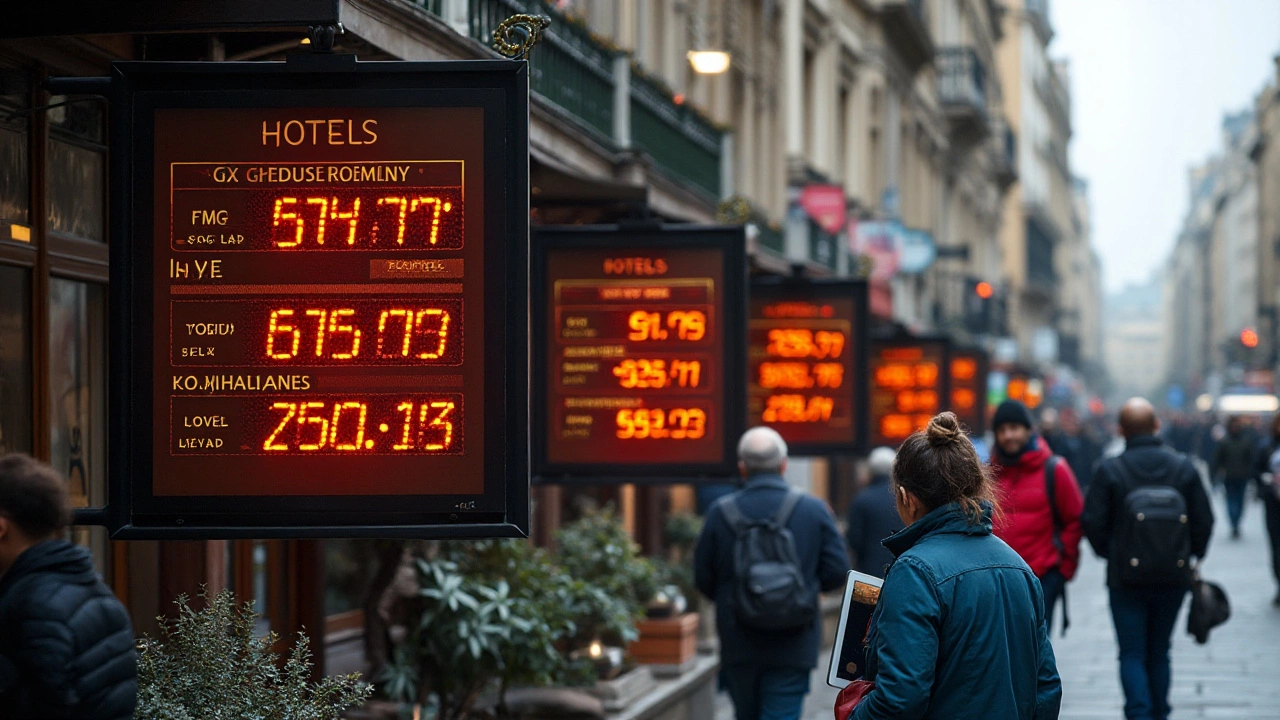Many travelers wonder if waiting until the last minute to book their stay will guarantee a cheaper price. It's a question that lingers in the minds of the budget-conscious and the savvy traveler alike. The notion is simple: hotels, like other sectors of the hospitality industry, occasionally drop prices as the date approaches to maximize occupancy. However, this isn't always a straightforward formula.
Hotel pricing is influenced by a myriad of factors, ranging from market demand to local events and even the season. Understanding the intricacies of these influences can help guests make informed decisions about when to hit 'book now'. In some cases, you might score a great deal just before you pack your bags, while in others, you may risk missing out entirely.
As we delve into this topic, we’ll uncover the strategies hotels use to adjust their rates and provide you with practical tips for navigating these often unpredictable waters. Whether you're planning a spontaneous getaway or meticulously crafting a once-in-a-lifetime vacation, this information could be your key to savvy travel.
- Understanding Hotel Pricing Strategies
- Factors Impacting Price Fluctuations
- When to Book for the Best Rates
- Tips for Last-Minute Booking Success
- Risks of Waiting for Lower Prices
- Alternatives to Traditional Hotel Bookings
Understanding Hotel Pricing Strategies
Hotel pricing is a complex art, almost as intricate as a symphony that plays on the strings of supply and demand. Many factors come into play, all fine-tuned to ensure that hotels maximize occupancy without losing revenue. Hotels employ dynamic pricing, which means they adjust their rates constantly based on ever-changing factors. For instance, during peak tourist seasons or when high-demand events like big conventions or festivals are imminent, prices tend to soar. Such price hikes are driven by the expectation that the demand will outstrip the supply.
The principle of yield management is at the core of hotel pricing strategies. Originating from the airline industry, it's used to predict consumer behavior and set rates that capitalize on it. Hotels often categorize rooms into different rate plans or 'fences,' such as refundable versus non-refundable or advanced purchase discounts. This distinction allows them to offer a range of prices to different types of travelers, capturing budget-minded visitors as well as those willing to pay for flexibility.
Moreover, hotels rely heavily on advanced analytics and sophisticated algorithms to guide their pricing decisions. An internal study might reveal that a midweek surge in business travelers could allow a hotel to raise prices slightly without losing bookings. Similarly, if a hotel notices that it isn't filling up at the expected rate, they might lower their prices to boost occupancy. As a result, the seemingly capricious nature of pricing is very much based on data and trends.
Brian Kelly, CEO of The Points Guy, once said, "Successful hotel pricing is about finding the perfect balance between occupancy and profit, where every single room is a revenue opportunity."
An intriguing aspect of hotel pricing is the role technology plays. Hotels employ revenue management systems that monitor booking patterns, market trends, and competitor pricing in real-time. This technology enables them to tweak prices almost immediately in response to market fluctuations. For travelers, this means that the price you see can change as swiftly as the weather, sometimes even within minutes.
There’s also a lesser-known tactic called 'fenced discounts,' where hotels offer significant reductions, but these rates come with certain conditions, like minimum stay requirements or no refunds on cancellations. These fences are less about the season or demand and more about ensuring that the discounted rate also works towards the hotel's goals of increased occupancy. Hotel deals can often be found this way if you meet the criteria. Understanding this landscape can empower travelers to make smarter booking decisions and maybe even turn that dream trip into a budget-friendly reality.
Factors Impacting Price Fluctuations
Diving into the dynamics of hotel pricing, it’s essential to recognize the multitude of elements that contribute to how prices adjust over time. One pivotal factor is the concept of supply and demand, a principle as old as commerce itself. During peak travel seasons or high-demand weekends, when droves of tourists descend upon popular destinations, hotels are likelier to hike up their rates. Think of summer in a beach town or the holiday season in a mountainous ski resort; it’s all about capitalizing on the influx of guests eager for accommodation.
On the flip side, during off-peak periods or quiet weekdays, the game changes. Hotels actively reduce prices to fill rooms that might otherwise sit vacant. This is when the savvy traveller can scoop up some of the best deals, highlighting the importance of timing in securing hotel deals. In fact, some hotels use dynamic pricing algorithms that adjust rates based on real-time data like current occupancy, weather predictions, and even competitor pricing. These fluctuations can happen in a matter of hours, making it crucial for potential guests to keep an eye on rate changes frequently.
According to a report by STR, "a hotel's pricing strategy can influence consumer behavior significantly, encouraging bookings when rates suggest a nearly sold-out scenario." This is one reason potential guests should stay informed about these changes.Geographical location also plays a significant role. Metropolitan areas with constant traffic might experience less variance compared to regional locales dependent on seasonal tourism. Event scheduling is another crucial determinant. Whether it's a prominent music festival, a sports championship, or simply a convention in town, events can drive hotel prices sky-high, often weeks or months in advance. In contrast, a last-minute cancellation of major events can reverse price spikes, presenting opportunities for spontaneous savings for adaptable travelers.
When we talk about economic factors, inflation and exchange rates are crucial considerations, particularly for international travelers. Significant shifts in the global economy can impact accommodation costs, making them variable over time. As a traveler, keeping abreast of such changes can guide better decision-making regarding when to book. By understanding these elements, travelers gain a competitive edge in the marketplace to make better-informed choices. Each factor interplays distinctively, contributing to a complex pricing web that every wise traveler can eventually navigate with diligence and a touch of patience.

When to Book for the Best Rates
Timing your hotel booking is almost an art form, impacted by various fluctuations in the travel industry. For many travelers, understanding when to book can mean substantial savings, which is why it’s important to get familiar with certain strategies. Notably, studies have shown that booking a hotel room too early or too late can sometimes lead to higher rates. Specifically, a report from the Travel Industry Association suggested that booking a room approximately one to three months in advance often yields the best rates. Another factor to consider is the day of the week you plan to book; many experts recommend making your reservations closer to the beginning of the week, as prices often rise towards the weekend.
"Timing your hotel booking just right can potentially save you up to 50%, especially if you avoid peak travel seasons," notes travel expert Laura Johnson in her latest travel trends report.Hotel pricing can also greatly depend on the type of destination. Popular tourist locales may require an earlier reservation strategy to secure the best deals, while lesser-known destinations might offer more flexibility. According to data from Booking.com, hotel prices in major cities such as New York or London tend to decrease as you approach off-peak seasons, like late winter or early spring.
If you're a frequent traveler, you might notice that even factors like loyalty programs and membership deals can influence booking times. Many hotel chains offer discounts and upgrades to members who book certain days in advance. While scouring for the ideal booking window, consider using resources like price alerts and comparison sites. These tools can notify you of significant price drops, providing you with the perfect time to lock in your reservation. Sometimes it's also beneficial to reach out to the hotel directly for potential exclusive deals they may not publish online. Booking strategies like these are essential weapons in fighting against steep accommodation prices.
A further method of predicting when rates might dip involves keeping an eye on local events and holidays. Large events like conferences or festivals can skyrocket demand and prices simultaneously. By staying informed of local calendars, a traveler can anticipate and dodge these potential price surges, ensuring they secure more favorable pricing. So, the short story is that booking your hotel accommodations requires a blend of savvy timing and smart resource utilization. With some preparation and a bit of flexibility, you can often secure an excellent hotel deal and optimize your travel budget effectively, without stress or doubt.
Tips for Last-Minute Booking Success
Booking a hotel at the last minute may seem daunting, but with a few strategic steps, it can often lead to securing unbeatable hotel deals. One of the first things to consider is being flexible with your location. Often, prime spots or cities come with higher price tags when booking late. Expanding your search radius just a few miles can open up a treasure trove of less-known gems with lower rates. These hidden boutique inns or smaller chain hotels often have competitive amenities and interesting perks. Lastly, don’t shy away from reaching out directly to the hotel. Sometimes hotels may have last-minute cancellations or unadvertised specials which can’t be found online.
Technology can be your best friend when securing last-minute bookings. There are numerous apps designed to assist travelers with finding accommodations on short notice. These apps often partner with hotels to offer exclusive travel tips and discounts for spontaneous guests. Booking apps like HotelTonight or LastMinute.com offer insights into ratings, amenities, and location benefits, ensuring you make an informed choice even under time constraints. Using technology to monitor price drops or availabilities can turn what might feel like a shot in the dark into a skilled transaction.
Understanding seasonal trends can also turn the tide in your favor. For example, even during peak seasons, a hotel might unexpectedly find itself with a room to fill due to a cancellation. Such moments could lead to a more favorable pricing for the quick-minded traveler. High-end hotels often experience random cancellations which can mean luxury at a fraction of the cost. Additionally, pay attention to booking strategies around weekdays and weekends. Monday through Thursday can generally offer better rates as occupancy is often higher on weekends when leisure travelers are in full swing.
Timing isn't just about the days of the week; it also involves being strategic about the time of day you search for accommodations. An intriguing aspect is hotels that release unsold rooms in the late afternoon for same-day sales, as they need to fill up their otherwise empty rooms. This often leads to attractive discounts for last-minute shoppers. More often than not, opting to check in later in the day can also present some last-ditch offers too attractive to resist. Hotel prices can fluctuate throughout the day, so keeping an eye on updates can help secure lower prices.
Staying informed about loyalty programs and membership opportunities can also be a game-changer for guests booking last minute. Many hotel chains offer loyalty points or discounts through direct sign-up programs or credit card partnerships. These perks can be utilized to bring down the cost of a last-minute stay substantially. Make connections with the staff with simple pleasantries, which sometimes leads to unexpected bonus perks, such as room upgrades or complimentary breakfasts. An anecdote from a seasoned traveler notes, "Building a rapport with hotel staff, even over a brief phone call, has led to some of my most serendipitous travel experiences."
Lastly, always research alternative lodging options. In recent years, alternatives like Airbnb or local vacation rentals can offer distinct advantages. They frequently have more flexible cancellation policies, enabling price adjustments to fit a last-minute budget effectively. Even within traditional hotel booking, sites like Priceline or Hotwire feature 'mystery' deals, which, although not revealing the hotel name until after booking, often allow savvy travelers to guess and score on premium establishments at hostel-like prices. These strategies open new doors to achieving that perfect blend of adventure, comfort, and budget mindfulness.

Risks of Waiting for Lower Prices
Too often, the allure of bagging a great hotel deal by procrastinating on bookings draws travelers into a maze of unpredictability. While it's true that last-minute bookings can score you a deal if the stars align, it's equally possible to end up paying more or facing fewer choices as your travel date looms closer. Hotels adjust their rates based on various factors, and these decisions are sometimes made at the last minute, leaving you with a surprise you didn't expect. In a high-demand scenario, such as during major events or holidays, the gamble can backfire tremendously. Rooms may fill up quickly, leading to a scarcity of options and consequently higher prices.
Moreover, even in a usual setting, preferred hotel prices can rise nearer to the date if sales seem to be trending upwards. Travelers often overlook the fact that last-minute travel generally does not allow for the luxury of choosing precisely the kind of accommodations or additional facilities you had in mind. Booking later could mean you're left with what's available rather than the room size, location, or amenities you truly desire. Occasionally, you may find yourself in a less desirable part of town or needing to settle for a higher-end suite that you never intended to book.
Another aspect worth considering is the potential added costs in flights or transportation arrangements if hotel prices dip unexpectedly but airfare does not correspond accordingly. A misalignment between these expenses can lead to an unexpected blow to your travel budget. Statistics often show that early bookers tend to receive better comprehensive travel package rates, due to bundling options that airlines and hotels offer together.
"Discount doesn't mean cheap—it means the price you paid leaves you standing for what you get," advises travel consultant, Jim Golding, in his insightful piece in Traveler's Digest.It's crucial therefore to balance the desire for cost-saving on accommodations with these potential additional expenses.
As with any kind of market play, having a backup plan or being slightly flexible can make the difference between feeling triumphant or settling for less under time pressure. Consider reward points or loyalty programs from certain hospitality chains, which may offer beneficial rates for those booking at the eleventh hour. These can provide a cushion against soaring hotel prices in select circumstances. We've seen cases where waiting it out did lead to steep discounts, but this is more an exception to the rule than guaranteed. Knowing these possible outcomes helps in making an informed decision, ensuring you don't just settle for the cheapest rate available but rather the best value for your needs and preferences.
Alternatives to Traditional Hotel Bookings
When we think about travel accommodation, hotel deals might come to mind first for many. However, an increasingly diverse set of options has been taking center stage, allowing travelers not only to save money but also enhance their travel experiences. One of the most popular alternatives is vacation rentals. Platforms like Airbnb and Vrbo have revolutionized the way we stay by offering homes, apartments, and unique lodging options often with more amenities than a traditional hotel. These can include full kitchens, multiple bedrooms, and even private pools. With such facilities, travelers enjoy a homelike experience that can be particularly valuable for families or groups looking for space and the convenience of cooking their meals. According to a recent survey, over 60% of millennials have used these platforms at least once for travel accommodation, demonstrating the trend’s popularity amongst younger generations.
Another intriguing option is the concept of home-sharing networks beyond Airbnb. Websites and communities like HomeExchange or Couchsurfing provide platforms for travelers to swap homes or crash on a local host's sofa. HomeExchange, for instance, allows you to open your home to fellow travelers, and in return, you can stay in someone else’s. It’s like swapping lives for a few days. It's not just about saving money; it's also about enjoying a local experience and rewarding cultural exchange. It's sharing stories over a morning coffee with a host or receiving personal tips about the best hideaways in the neighborhood.
"The sharing economy is reshaping how people think about assets and ownership, offering flexibility and value beyond traditional economic structures." - The Economist
For those who like a bit more structure and guidance, hostels remain an ever-reliable option. While many might associate hostels with youth backpackers, modern hostels have evolved to include private rooms and upscale amenities, catering to a broader age range and demographic. With the added advantage of social atmospheres and planned activities, they are perfect for solo travelers or those looking to make new friends on the road. Did you know that there are more than 15,000 hostels worldwide offering more than just dorm beds? Cities like Berlin, Tokyo, and Buenos Aires have seen hostels rise to become cultural hubs themselves.
If a truly off-beat experience is what you're seeking, consider booking a stay at a treehouse, yurt, or glamping site. These unique accommodations offer novel ways to experience travel with a bit of adventure. Websites like Glamping Hub curate an impressive selection of luxury camping options, from safari tents in Africa to igloos in Finland. Such stays not only promise breathtaking views but create lasting memories that go beyond a simple bed for the night. After all, how often can one recount sleeping under the stars with just a thin fabric canopy in a lush forest or hearing the waves crash against a cliffside?
No matter what your preference or travel style, there's an abundance of travel tips and creative lodging options to consider. These accommodations offer rewarding experiences that can alleviate the strain of travel costs while providing quality stays. As you plan your next journey, consider exploring these non-traditional routes, as they might just add a delightful twist to your travels.
